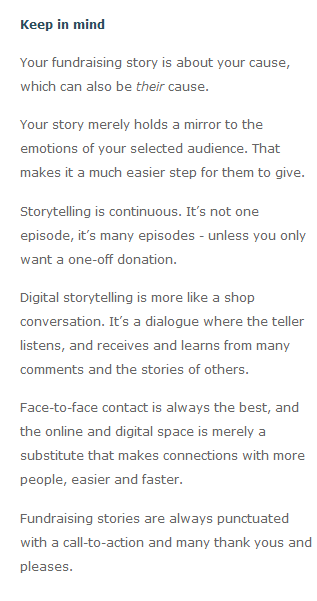In fundraising, the digital marketing space can be rich pickings for storytellers.
Written for the Fundraising of New Zealand May 2014 Magazine: By Fraser Carson
 A couple of quotes to note about storytelling. “You can fix anything but a blank page” author Nora Roberts once warned her friends. And: “after nourishment, shelter and companionship, stories are the thing we need most in the world” cooed British writer Philip Pullman. Oh and there’s a third: “every great love starts with a great story...” said novelist Nicholas Sparks.
A couple of quotes to note about storytelling. “You can fix anything but a blank page” author Nora Roberts once warned her friends. And: “after nourishment, shelter and companionship, stories are the thing we need most in the world” cooed British writer Philip Pullman. Oh and there’s a third: “every great love starts with a great story...” said novelist Nicholas Sparks.
Storytelling has been around since dot, but right now the online digital age is making the art of telling a good story synonymous with effective marketing – read, make that effective fundraising.
Got you thinking? But hang on: story telling is for entertainment, the theatre... a good book. What has it got to do with fundraising?
Consider this. Modern advertising has been around since the industrial revolution; some would say much longer. Effective advertising has always relied on the ability to tell a great story. So it’s hardly surprising that the digital age is highlighting the need like never before. Why? Because all effective digital communication is fast paced and very public. That means every experience can be shared, commented upon, retold, expanded and retold again and again. In other words, a little success can quickly turn into a big success, and gratification can be instant, but so can permanent rejection.
 The winners in this fast paced world are those who can engage and re-engage with people where they live. No one cares about your fundraising goals, your next campaign strategy or what knobs are on your board. But if they care about people with epilepsy or maybe children with learning difficulties, your cause might just connect with them where it matters. The tools and stories are anything that works to engage people and convert them to be supporters and advocates – great copy, sparkling pictures, compelling video, a nifty smart phone app.
The winners in this fast paced world are those who can engage and re-engage with people where they live. No one cares about your fundraising goals, your next campaign strategy or what knobs are on your board. But if they care about people with epilepsy or maybe children with learning difficulties, your cause might just connect with them where it matters. The tools and stories are anything that works to engage people and convert them to be supporters and advocates – great copy, sparkling pictures, compelling video, a nifty smart phone app.
So this is the crux of the matter. At the recent 2014 FINZ Conference I ran a workshop about “how to plan an online strategy”. Most of it was devoted to the need to understand your cause and your mission, and to set some meaningful goals around all of this. I then set a small task (a challenge) with the room divided into groups, where they considered a hypothetical fundraising cause, and report back. In each case, after only about 10 minute’s deliberation, the groups reported back by pitching the cause to me, and the others in the room... with a story.
If you’ve ever doubted it, we humans are suckers for anything if we can be made to cry, laugh or just feel something in our stomachs. It’s called ‘emotion’. Yet more often than not, our fundraising communications are surreally rational; more like the clipped mumblings of a Siberian quantity surveyor – cold and calculating.
Why is this so? I think it has something to do with a need to play safe and feel like we are in control. Emotions are fickle places and our institutional instincts tend us towards rational function. But the very digital environment that makes storytelling so compelling as an opportunity, might also be turning many fundraisers into impatient gurus in waiting. By that I mean there is an insatiable thirst for instant answers, when in reality fundraising, like most worthwhile pursuits is much more nuanced than is possible with a glib and simplistic answer. After all, digital success can’t be measured by how many ‘likes’ you get on Facebook or whether your Google Analytics is trending upwards. In the end it’ll be measured by how much money you’ve raised. I can guarantee that for every successful fundraising campaign, which repeats and builds over time, it’s mostly because there are people out there who’ve been willing to part with their money because they responded with their hearts, much more than with their heads.
And here’s the paradox. Our emotions are not merely the area of our brain that responds positively to the stimulus of good storytelling, it also helps us to trust. While our rational side helps us weigh the options and respond in a measured way, our subconscious can be even more powerful in filtering between attraction and rejection, particularly when we have little time to make judgements.
While I think of it, storytelling is not just about spinning a good yarn. Whether the story is a piece of fiction or not, being authentic is important in promoting trust and most good causes should have little problem in telling it that way.
So it’s time to learn the art of storytelling, and if you’re descended from a Serbian quantity surveyor (I apologise), but please have the good sense to find someone who can help you.
A history of good storytelling
Most of my working life has been in advertising and marketing. It’s an industry that’s creative and prepared to take chances.
My experiences of fundraising campaigns in more recent times have shown how badly wrong some advertising people can be on fundraising campaigns. There are some very practical things that good fundraisers learn about what works, and what doesn’t work that advertising people completely miss on their way to coming up with the next clever-clogs ad.
But I won’t be too hard on advertising, because in the area of storytelling, a good strategy and great creative writing are essential elements. After all, it takes a good imagination to tell a good story, and let’s face it, not everyone has it.
But good writing (or video, image galley, etc) is just the ‘delivery’ end of the equation. The strategy is the foundation upon which all good campaigns happen and from which good stories are born.
So here’s my tips about writing a fundraising strategy for digital storytelling:
- Set SMART goals that are Specific, Measurable, Attainable, Relevant and Timely.
- You only have a cause because there is a problem you wish to solve. If you can define the problem so that it can be understood and shared by other willing participants, you’re off to a good start in creating a great story.
- Identify your audience and understand their emotional triggers. You will never be on track all of the time, but the trick is to keep listening, learning and adjusting.
 Fraser Carson is grateful to have the opportunity to share knowledge and ideas through this blog. He is the founding director of Flightdec.com, The Crowd Blog.com, Wotzon.com and Issues.co.nz. Fraser is a marketer and communications expert, and a developer and commentator on online and community building issues with a particular interest and involvement in the Collective Impact method of working cooperatively.
Fraser Carson is grateful to have the opportunity to share knowledge and ideas through this blog. He is the founding director of Flightdec.com, The Crowd Blog.com, Wotzon.com and Issues.co.nz. Fraser is a marketer and communications expert, and a developer and commentator on online and community building issues with a particular interest and involvement in the Collective Impact method of working cooperatively.
